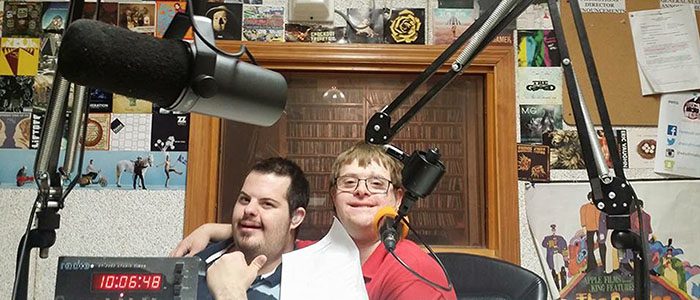Article by Elizabeth Richardson on January 20, 2017
Before hitting the airwaves on East Stroudsburg University’s 90.3 WESS radio December 6, disc jockeys Ronald Nagel and Donald Laudenslager made sure they were prepared.
The students, who are part of ESU’s Career, Independent Living & Learning Studies (CILLS) program, had worked with CILLS paraeducator Dylan Doran to choose a dozen songs by rock groups such as Green Day, Imagine Dragons and Fallout Boy to play on air.
They combed through potential music for foul language, which could result in hefty fines for the non-commercial radio station from the Federal Communications Commission. Nagel and Laudenslager worked with Doran to write introductions to each of the songs.
So when the big day came, they were ready.
Jill Deiley, WESS station manager and an ESU junior communication major, said Nagel and Laudenslager did such a good job on their first show, she expects them to appear weekly this semester.
“They did great,” Deiley said. “They were probably among our most prepared DJs for their first show. They spent a lot of time planning their playlist and organizing stories for the show.”
Doran, who lived with Nagel and Laudenslager for two years as a house mentor before graduating from ESU last May with a bachelor’s degree in rehabilitative and human services, said he worked the control boards during the radio show but the newly minted DJs did the rest.
“They were really excited,” Doran said. “They walked out of the station with huge smiles on their faces. They were telling everybody they had just finished their first show.”
He gets no argument from Nagel and Laudenslager.
“The first show went really well,” Nagel said. “We’ve done a lot of good music so far.”
“It’s awesome,” agreed Laudenslager.
The three-year CILLS program at ESU allows participants with intellectual disabilities to be integrated into the ESU campus community, which includes joining college activities alongside ESU students while taking courses that help them learn practical skills in independent living. That includes such tools as money management as well as skills for jobs.

CILLS is not a degree program, but rather, participants graduate with a certificate. It is operated through the College of Education’s Department of Special Education and Rehabilitation. ESU students in that department get hands-on experience working with CILLS participants, helping them with classes and socializing with them.
Along with other CILLS participants, Nagel started attending weekly radio station meetings in 2015-2016. He was soon working with station staff doing the behind-the-scenes tasks, such as organizing and putting away CDs and records for the DJs. Among other job skills, he learned the importance of punctuality.
“You have to make sure you are on time,” he said. “You can’t be late.”
Nagel delved right into the radio station culture, hanging out with ESU students there and helping out. Last fall, Laudenslager joined him and the volunteer work turned into an internship for both of them.
Seeing their commitment, Deiley started working toward getting them on the air.
She arranged for the pair plus Doran to take the station’s mandatory exam on the WESS manual before they could become DJs. They all passed and started to shadow DJ Taylor Drew, an ESU senior, and others to see how it’s done.
“We’re really happy they’re an addition to our staff,” said radio station adviser Robert McKenzie, Ph.D., who is also professor and chair of communication at ESU. “We’re always trying to reach new heights with our diversity in terms of the background of our members. This is just one more example of the wide appeal of the radio station to give CILLS participants a place there as well.”
That’s exactly the kind of inclusion that has made the university’s CILLS program increasingly popular, according to Terry Barry, Ed.D., dean of the College of Education.
“We’re looking for the CILLS participants to have authentic experiences and this is just one example,” Barry said. “They can not only play music but they understand the workings that go on behind the scenes when producing shows and writing scripts and so forth.”
After graduating with his CILLS certificate this spring, Nagel has lined up an internship at Villanova University’s radio station through the Villanova CILLS program.
Meanwhile, he and Laudenslager are looking forward to more airtime this spring. Of CILLS, Nagel said: “It’s really a great program.”


Leave A Comment